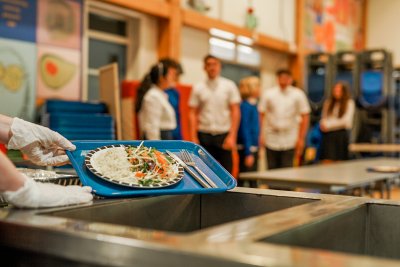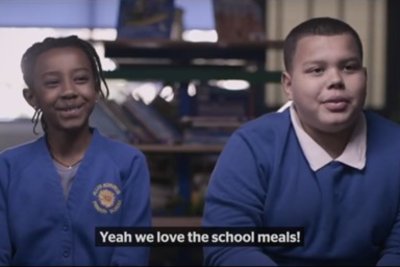News • Children's Food Campaign
Children's food coalition opposes free school meal cuts
A letter opposing the recently announced cuts to plans to make free school meals available to every primary school child living in poverty has been sent to Education Secretary Michael Gove by a coalition of health, education and anti-poverty organisations.
The letter, signed by 14 organisations, including the Royal College of Paediatrics and Child Health, Diabetes UK and the Children's Food Campaign, criticises the cuts and calls for the decision to be reviewed as part of the Comprehensive Spending Review process.
Jackie Schneider, Children's Food Campaign Coordinator said:
“It is outrageous that families can be officially living below the poverty line and yet their children are not entitled to free school meals. The planned changes would have gone some way towards addressing this; it is now primary school children from the poorest families who will pay the price.”
School meals cost parents around £300 a year per child, so losing this benefit represents a significant disincentive to parents moving into work. Had the plans to extend eligibility gone ahead, an estimated 50,000 children would have been lifted out of poverty.
Ends
For further information please contact Christine Haigh or Jackie Schneider on 0203 5596 777 / 07870 577934 (Christine) / 07795 213425 (Jackie) or Christine@sustainweb.org / Jackie@sustainweb.org.
Notes to editors:
1) The Children's Food Campaign wants to improve children's health and well-being through better food - and food teaching - in schools, and protecting children from junk food marketing. We are supported by over 300 organisations. The Children's Food Campaign is coordinated by Sustain: the alliance for better food and farming and funded by the British Heart Foundation. For more information please go to: http://www.childrensfoodcampaign.org.uk/
2) The letter was signed by the Association of Teachers and Lecturers, Centre for Food Policy, Child Poverty Action Group, Children's Food Campaign, Diabetes UK, Faculty of Public Health, GMB, NASUWT, National Heart Forum, National Union of Teachers, Royal College of Nursing, Royal College of Paediatrics and Child Health, Royal College of Physicians and UNISON.
3) Copies of the letter were also sent to Health Secretary Andrew Lansley, Children's Minister Sarah Teather and Parliamentary Under Secretary for Children Tim Loughton.
4) The cuts were announced in a letter from Education Secretary Michael Gove to shadow Education Secretary Ed Balls on 7 June. The letter can be accessed at http://www.education.gov.uk/news/news/~/media/Files/lacuna/letters/MichaelGovetoEdBallsCuts.ashx
5) Plans to extend eligibility for free school meals to all primary school children living below the poverty line were announced in the Pre-Budget report in December 2009.
6) Free school meals are currently only available to families receiving out of work benefits, meaning that a major extra cost of around £300 per year per child hits families when they are trying to make themselves better off through work.
7) The poverty line for a couple with two children (before housing costs and net of taxes) is £374 a week, or £19,500 a year. For more information, see HBAI table 2.3 from DWP: http://research.dwp.gov.uk/asd/hbai/hbai_2009/pdf_files/full_hbai10.pdf
8) The average cost of a primary school lunch is £1.66 a day, or £290 per year according to the School Food Trust. For more information, see http://www.schoolfoodtrust.org.uk/UploadDocs/Library/Documents/sft_elasticity_of_demand.pdf
9) The text of the letter was as follows:
Dear Secretary of State,
Re: extended free school meal eligibility cancellation
We are deeply concerned at your recent decision not to proceed with the extension of free school meal eligibility to an estimated half a million primary school children from low income working families.
The recent Strategic Review of Health Inequalities in England post-2010 highlighted the disadvantages faced by those from the lowest socio-economic groups, and the importance of giving every child the best start in life. Ensuring that all primary school children living in poverty receive a healthy school meal would make a considerable contribution to reducing both education and health inequalities.
For example, the introduction of nutritional standards for school meals, guarantees those children who take advantage of them at least two of their five daily portions of fruit and vegetables, along with other essential vitamins and minerals. In a country where almost one-third of children are overweight or obese by the time they reach the end of primary school, school meals have an important role to play in developing healthy eating habits.
Eating healthy school meals, in particular exposing children to foods such as new types of fruits and vegetables which they might not otherwise have tried, influences not only the food children eat at home, but also what their families eat. Only one per cent of packed lunches meet the nutritional standards for school meals. As a result, those children who are not eligible for free meals, and whose parents are unable to afford to pay for a school meal each day, are unable to eat as healthily as their peers.
Eating food and drink high in fat, sugar or salt is linked to poor behaviour, resulting in poorer discipline and educational engagement for all children. By contrast, healthier school meals have been shown to improve classroom behaviour, helping to improve academic performance and attainment.
Poverty among working families is a significant problem in this country: currently, sixty per cent of children living in poverty have at least one parent in work. The planned extension of eligibility would have lifted 50,000 such children out of poverty. Instead, this significant barrier to parents entering employment remains. With the average primary school meal costing £1.66, failure to qualify for free school meals results in a “tax” of over £300 per child on parents returning to work.
We therefore urge you to review this decision as part of the Comprehensive Spending Review process and look forward to your response.
Published Monday 21 June 2010
Children's Food Campaign: Better food and food teaching for children in schools, and protection of children from junk food marketing are the aims of Sustain's high-profile Children's Food Campaign. We also want clear food labelling that can be understood by everyone, including children.





